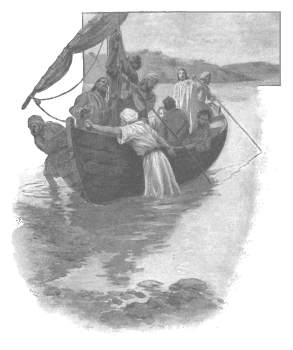|
Text
|
Comments
|
|
The
demoniacs of Gadara. Also Luke 8:26-39;
Matt.
8:28 to 9:1.
|
.1
¶ And they came over unto the other side of the sea, into the country
of the Gadarenes.
2 And when he was come
out of the ship, immediately there met him out of the tombs a man with
an unclean spirit,
3 Who had his dwelling
among the tombs; and no man could bind him, no, not with chains:
4 Because that he had
been often bound with fetters and chains, and the chains had been plucked
asunder by him, and the fetters broken in pieces: neither could any man
tame him.
5 And always, night
and day, he was in the mountains, and in the tombs, crying, and cutting
himself with stones.
6 But when he saw Jesus
afar off, he ran and worshipped him,
7 And cried with a loud
voice, and said, What have I to do with thee, Jesus, thou Son of the most
high God? I adjure thee by God, that thou torment me not. |
1 -
Gadarenes
From the word, we would identify these people with a city of Gadara. Such
a city southeast of the Sea of Galilee existed. It was too far to be the
home of the insane men but had been the capital city of the area and the
people could have identified with that. The gospel accounts use slightly
different city names so we cannot be sure. Scholars tend to favor the name
"Gerascenes." Compare the Palestine and the Galilee
maps.
5 -
Cutting
himself with stones As influenced by the demons. Neither Matthew
nor Luke mention this. It was done by pagan worshippers
1ki1828,
je1606.
6 -
When
he saw Jesus Although bound by Satan, the man sensed that Jesus
could help him. The words from his mouth were not his own. See
lu0826ff
for other insights. |
.8
For he said unto him, Come out of the man, thou unclean spirit.
9 And he asked him,
What is thy name? And he answered, saying, My name is Legion: for we are
many.
10 And he besought him
much that he would not send them away out of the country.
11 Now there was there
nigh unto the mountains a great herd of swine feeding.
12 And all the devils
besought him, saying, Send us into the swine, that we may enter into them.
13 And forthwith Jesus
gave them leave. And the unclean spirits went out, and entered into the
swine: and the herd ran violently down a steep place into the sea, (they
were about two thousand;) and were choked in the sea.
14 And they that fed
the swine fled, and told it in the city, and in the country. And they went
out to see what it was that was done.
15 And they come to
Jesus, and see him that was possessed with the devil, and had the legion,
sitting, and clothed, and in his right mind: and they were afraid.
16 And they that saw
it told them how it befell to him that was possessed with the devil, and
also concerning the swine.
17 And they began to
pray him to depart out of their coasts. |
8 -
Come
out ... What is thy name? Is it wise for us to dialogue with
the devils? Jesus spoke of casting them out mt1008.
Notice verse 10. They knew that Jesus was in authority. Although now clothed
with humanity, He was still commander of the heavenly host and of them
who had been a part of it re1207.
It is He who sets the bounds of Satan's power. See note
for v8.
13
- Jesus gave them leave This was an economic loss to the
owners, but helped them evaluate their objectives in the light of heaven.
Also the pigs had already been cursed as human food. See le1107
and note at the bottom of
that page.
15
- Clothed He had been naked lu0827.
Did Jesus provide clothing by a miracle? Perhaps, or maybe He gave the
men garments of His own which He had brought for the occasion. |
. 18
And when he was come into the ship, he that had been possessed with the
devil prayed him that he might be with him. 18
And when he was come into the ship, he that had been possessed with the
devil prayed him that he might be with him.
19 Howbeit Jesus suffered
him not, but saith unto him, Go home to thy friends, and tell them how
great things the Lord hath done for thee, and hath had compassion on thee.
.20
And he departed, and began to publish in Decapolis how great things Jesus
had done for him: and all men did marvel. For "Decapolis" see note below.
18
- You might stop and think what these three verses mean for us.
21
- The story of the afflicted woman and the sick daughter also begins
as in the bar. |
|
The
invalid woman and the daughter of Jarius. Mark 5:21-43; Luke
8:40-56; Matt. 9:18-26.
|
| .21
¶ And when Jesus was passed over again by ship unto the other side,
much people gathered unto him: and he was nigh unto the sea. |
21
- Passed over again From the vicinity of Gergesa where Jesus
had cast demons out of two wild men v1. |
22 And, behold, there
cometh one of the rulers of the synagogue, Jairus by name; and when he
saw him, he fell at his feet,
.23
And besought him greatly, saying, My little daughter lieth at the point
of death: I pray thee, come and lay thy hands on her, that she may be healed;
and she shall live.
24 And Jesus went with
him; and much people followed him, and thronged him.
.25
And a certain woman, which had an issue of blood twelve years,
26 And had suffered
many things of many physicians, and had spent all that she had, and was
nothing bettered, but rather grew worse,
.27
When she had heard of Jesus, came in the press behind, and touched his
garment.
28 For she said, If
I may touch but his clothes, I shall be whole.
29 And straightway the
fountain of her blood was dried up; and she felt in her body that she was
healed of that plague. |
22
- Fell at his feet Compare es0302,
mt0211,
mt0802.
23
- She shall live From this certainty, as the resurrection
of Lazarus and especially of Jesus Himself, we know that we, too, will
live again, physically restored after death jb1414,
1co1552.
25
- Issue of blood She was ceremonially unclean as well as
physically dying.
27
- Touched his garment The border lu0844.
28
- If I may touch This is the kind of trust we need mt1720.
This took physical effort and courage.
29
- Felt Literally "knew."
29
- Plague Often considered to be punishment for sin mr0140,
jn0902. |
.30
And Jesus, immediately knowing in himself that virtue had gone out of him,
turned him about in the press, and said, Who touched my clothes?
31 And his disciples
said unto him, Thou seest the multitude thronging thee, and sayest thou,
Who touched me?
32 And he looked round
about to see her that had done this thing.
33 But the woman fearing
and trembling, knowing what was done in her, came and fell down before
him, and told him all the truth.
34 And he said unto
her, Daughter, thy faith hath made thee whole; go in peace, and be whole
of thy plague. |
30
- Immediately knowing Although Christ worked in the power
of the Father and, no doubt, with the assistance of angels, we assume He
knew in advance all of what would happen jn0530.
His question, "who touched my clothes?" reveals that His knowledge was
not from the physical contact. The lady's testimony would be a blessing
to those who heard it — and for us.
30
- Virtue Literally "power."
32
- He looked Literally "He kept looking." Thus He blessed
her by His personal attention and helped her and readers of this story
know that the "touch" had not healed her.
34
- Faith She was made whole by faith. The two events of being
made whole in this verse represent spiritual and physical healing. |
.35
¶ While he yet spake, there came from the ruler of the synagogue's
house certain which said, Thy daughter is dead: why troublest thou the
Master any further?
 36 As soon as Jesus heard the word that was spoken, he saith unto
the ruler of the synagogue, Be not afraid, only believe.
36 As soon as Jesus heard the word that was spoken, he saith unto
the ruler of the synagogue, Be not afraid, only believe.
37 And he suffered no
man to follow him, save Peter, and James, and John the brother of James.
38 And he cometh to
the house of the ruler of the synagogue, and seeth the tumult, and them
that wept and wailed greatly.
.39
And when he was come in, he saith unto them, Why make ye this ado, and
weep? the damsel is not dead, but sleepeth.
40 And they laughed
him to scorn. But when he had put them all out, he taketh the father and
the mother of the damsel, and them that were with him, and entereth in
where the damsel was lying.
.41
And he took the damsel by the hand, and said unto her, Talitha cumi; which
is, being interpreted, Damsel, I say unto thee, arise.
42 And straightway the
damsel arose, and walked; for she was of the age of twelve years. And they
were astonished with a great astonishment.
43 And he charged them
straitly that no man should know it; and commanded that something should
be given her to eat.
36
- Only believe Jairus must have loved his girl more than
his job to ask Jesus to come. Now she is dead and Jesus invites him to
even stronger faith. He does this for us too as we follow Him.
39
- Sleepeth Death had been called a sleep in the Scriptures
of that time but pagan ideas had confused a clear understanding of what
happens in death. See on lu1619.
Jesus also said Lazarus was sleeping jn1111.
43
- Something ... to eat This shows how Jesus cares about our
physical comfort but, more than this, we see that the girl was fully restored. |
 18
And when he was come into the ship, he that had been possessed with the
devil prayed him that he might be with him.
18
And when he was come into the ship, he that had been possessed with the
devil prayed him that he might be with him.
 36 As soon as Jesus heard the word that was spoken, he saith unto
the ruler of the synagogue, Be not afraid, only believe.
36 As soon as Jesus heard the word that was spoken, he saith unto
the ruler of the synagogue, Be not afraid, only believe.